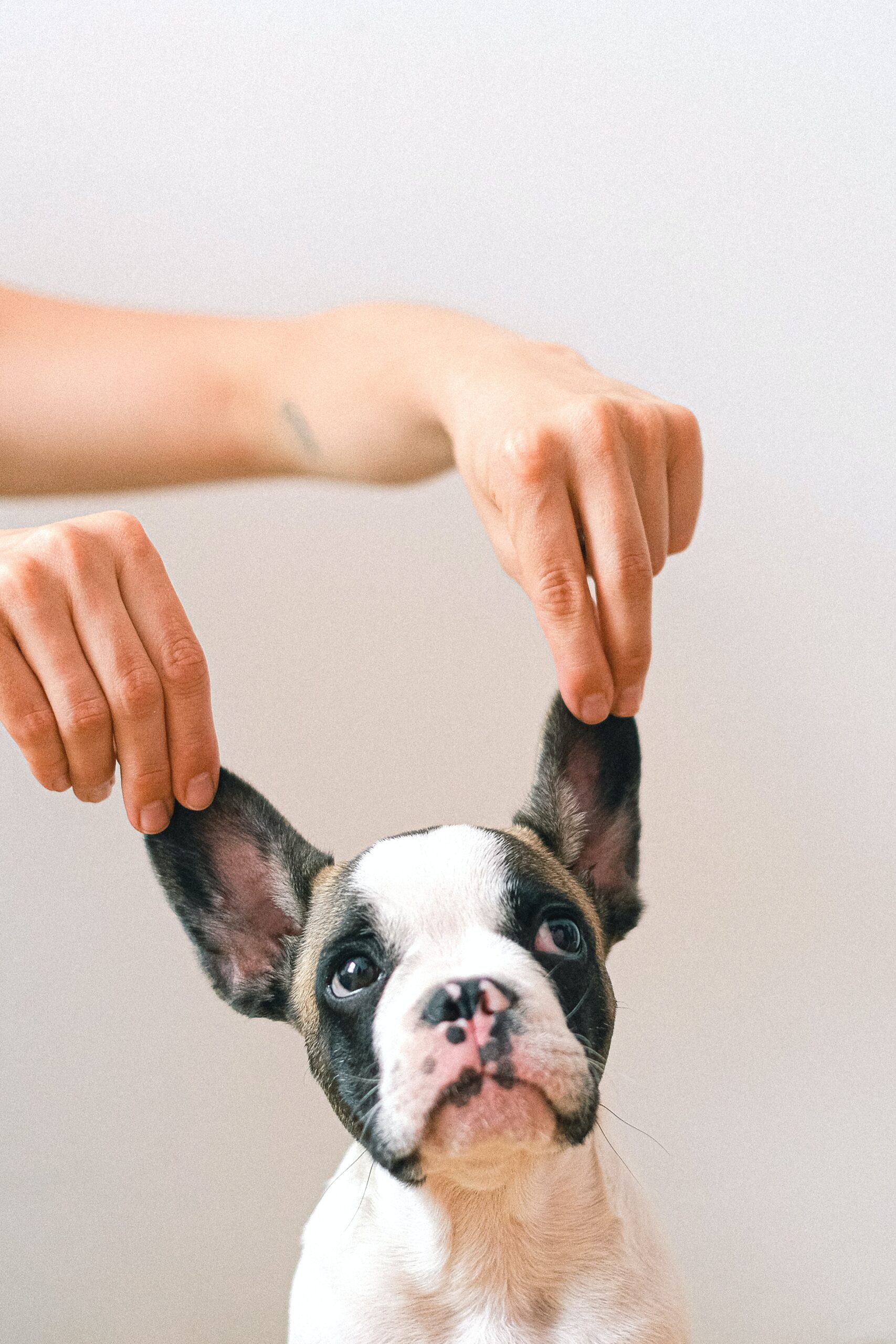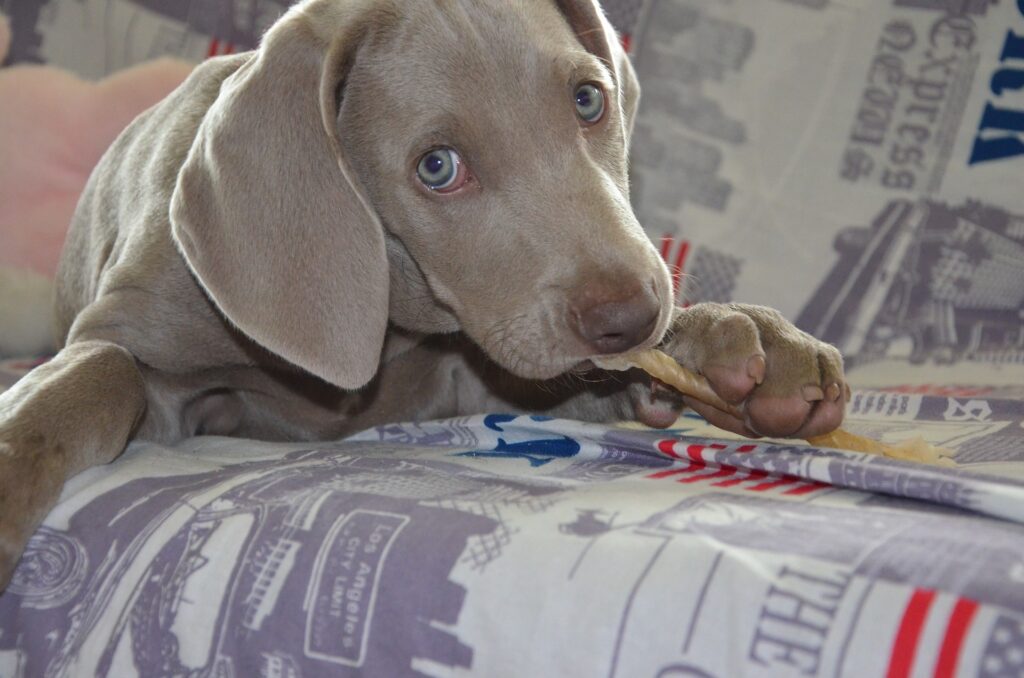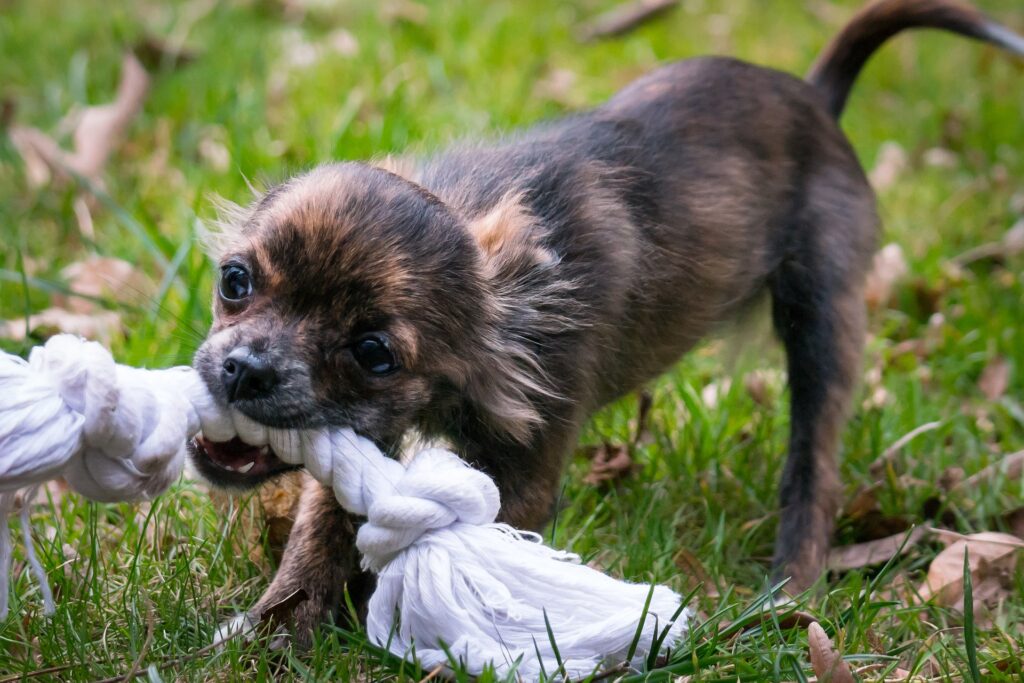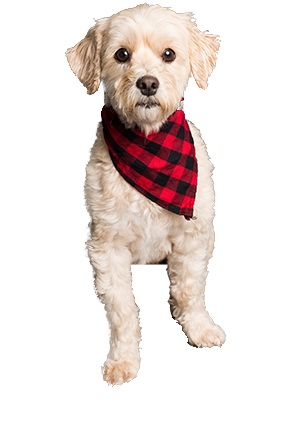
When does puppy teething start and end?
Wondering when your pup will start teething, and how long it will last? This post has everything you need to know about puppy teething – read on for more information!
Sign Up To Receive Exclusive Emails, Content, & Offers.
Also get our Free "The Airplane Game" eBook
You have subscribed successfully!
Some error occured
Please fill all the required * fields.
Your information will remain secure and will not be shared with anyone.

There’s nothing more frustrating than having your puppy constantly bite you.
Not only is it painful, but it can also be quite dangerous if they’re not properly trained. Fear not, though, because there are plenty of ways to stop your puppy from biting. In this blog post, we’ll discuss some of the most creative techniques that you can use to nip this bad habit in the bud.
So keep reading for helpful tips on how to teach your pup proper behavior!

One of the most important things to remember when training a puppy is to start with positive reinforcement.
This means rewarding them when they do something you want them to do, such as gently sniffing your fingers or nibbling on your hand. This lets them know that this behavior is acceptable and they will be more likely to repeat it in the future.
Of course, you also need to be consistent with this approach and make sure that everyone in the family is using the same methods. But if you start off on the right foot, it will make training your puppy much easier in the long run.
If your puppy starts to bite, it’s important to nip the behavior in the bud right away.
The best way to do this is to say “NO” in a firm voice and then stop interacting with them for a few minutes. This will help them to understand that biting is not acceptable behavior.
You can also gently push them away to give them a little bit of discomfort, which will help reinforce that biting is not something you want them to do. With a little patience and consistency, you should be able to train your puppy not to bite.

If you have a puppy that’s into biting everything in sight, you’re probably looking for ways to get them to stop.
The good news is, there are a few things you can do to dissuade your puppy from biting. One is to immediately provide them with a toy or chew bone as soon as they start showing interest in biting you.
This will help distract them from their urge to chew on your fingers and toes, and it’ll also give them something to sink their teeth into that’s specifically meant for puppies.
Additionally, try to avoid playing too rough with your puppy, as this can often encourage them to bite.
If they do happen to bite you, don’t punish them; instead, calmly remove yourself from the situation and provide them with an appropriate chew toy. With a little patience and training, your puppy should eventually outgrow their urge to bite everything in sight. Here are some chew toys we recommend below.
One of the most frustrating things about puppyhood is dealing with nipping and biting.
It’s important to be consistent with your commands and rewards, and remain patient while training your puppy.
If they nibble and start to gently gnaw on your hands with no pressure, award them with treats. Once they realize that biting equals no more attention or playtime, they’ll quickly learn to avoid it.
Be sure to give them plenty of chew toys to help redirect their biting instincts. With a little time and patience, your puppy will outgrow this phase and become a well-mannered dog.
If your puppy biting is getting out of control, it may be time to seek help from a professional trainer.
This is especially true if the problem persists after 3-4 months of trying to correct it yourself.
A professional trainer can help you identify the root cause of the problem and develop a training plan that will address it effectively.
They can also provide guidance on how to properly socialize your puppy and teach them bite inhibition. While seeking professional help may seem like a daunting task, it can be well worth it in the long run.
Not only will you be able to resolve the puppy biting issue, but you’ll also have peace of mind knowing that your puppy is learning from a certified professional.
So, those are our top five tips for training your puppy not to bite. It’s definitely a process that takes time and patience, but is well worth it in the end. If you have any questions or run into any problems, be sure to let me know in the comments below or shoot us an email. And don’t forget to follow us on Instagram @My_dogluvs_me for more helpful tips!

Wondering when your pup will start teething, and how long it will last? This post has everything you need to know about puppy teething – read on for more information!
With the ever-growing popularity of social media, videos of adorable pets continue to captivate audiences worldwide. Recently, a delightful tale has emerged that is grabbing attention and bringing smiles to faces across the globe—a dog that decided to take the unconventional route of reentering its home through the kitchen window.
Meet the canine star of our story: Buddy, a talented and mischievous golden retriever. Filled with boundless energy and curious enthusiasm, like any dog with a zest for life, Buddy embarked on an unexpected journey that led him back into the house via the kitchen window.
This heartwarming incident occurred when Buddy found himself locked out in the backyard after his family had left home. Despite his momentary predicament, Buddy’s determination and quick thinking showed that he was not to be deterred by a closed door.
The viral fame came when Buddy’s antics were captured on the home security camera and subsequently shared online by his amused owner, resulting in not just millions of views but countless likes and shares.
Buddy’s “window rescue” has sparked interest and prompted questions about what drives dogs to engage in such creative behavior. While Buddy might seem like an exceptional case, he highlights some typical traits seen in many dogs:
While Buddy’s adventure is heartwarming and amusing, it acts as a reminder for pet owners to assess the safety of their homes for their furry friends. Some considerations include:
Stories like Buddy’s serve not only as entertainment but also illustrate the wonderful ways in which pets enrich our lives. Social platforms and blogs spotlight these moments, creating shared experiences among animal lovers worldwide.
It’s crucial to continue engaging our online audiences by sharing more delightful pet stories. Audiences are always keen to see charming and adventurous tales. Consider:
As the tale of Buddy’s sneaky yet determined return home spreads online, it reminds us of the simple joys that pets bring into our lives. Buddy, the loveable dog who climbed through a kitchen window, has brought laughter and warmth to countless people, uniting them through his charming display of intelligence and personality.
Indeed, in a world where distractions are many, it is often the unguarded antics of our pets that provide genuine moments of joy and connection. As Buddy continues to delight audiences around the world, may his story serve as a testament to the enduring charm and whimsicality of our beloved four-legged companions.

Chiwееniеѕ liсk for mаnу diffеrеnt reasons. Usually licking is nоt something to bе соnсеrnеd about hоwеvеr if thе liсking
In the serene suburban neighborhoods where lawns stretch with lush green and gardens bloom with vibrant colors, an unexpected event can often break the tranquility in the most delightful way. Recently, this charming tale unfolded when a pair of golden retrievers, known for their playful and inquisitive nature, turned a simple day into an exciting adventure by digging up a surprising guest in their backyard—a groundhog.
Golden retrievers, with their reputation for being both amiable family companions and enthusiastic explorers, are no strangers to causing some excitement. On a seemingly ordinary day, the two golden retrievers decided to put their noses to the ground and dig into a curious venture in their backyard. Little did they know that their mischievous act of digging would lead to uncovering a living, breathing creature—a groundhog!
The dogs’ owner, initially oblivious to the unfolding drama, was drawn to the scene by the sounds of excited barks and frantic paws at work. Upon approaching the site of the canine commotion, they were met with the astonished eyes of a groundhog, peeking out from the newly unearthed burrow. In that moment, what started as a typical backyard escapade turned into an interaction with the natural world.
Groundhogs, also known as woodchucks, are a common sight in many parts of North America, where they thrive in woodlands, fields, and suburban areas. These creatures are skilled burrowers, creating intricate tunnel systems which serve as their homes.
Having such an interesting creature make an appearance in a typical suburban backyard is a reminder of the diverse wildlife that coexists with human habitation, often right under our noses.
The encounter between the golden retrievers and the groundhog was a dance of curiosity and cautiousness. Dogs, naturally curious, often find themselves puzzled when they come face to face with wildlife. In this scenario, the golden retrievers, known for their gentle demeanor, were more intrigued than alarmed by their newfound furry neighbor. While the dogs engaged in bouts of barking and sniffing, the groundhog displayed a unique mix of boldness and care, understanding its place as a visitor in the yard.
This uncommon meeting was a gentle reminder of the rich interactions that continue to enrich our lives, and how even common backyard facilities are teeming with wildlife just waiting to be discovered.
Such adventures remind us of the delicate balance in shared spaces between human habitation and wildlife. As urban areas continue to expand, moments like these gain importance by bringing awareness to the presence of wildlife and encouraging harmonious coexistence.
While the groundhog may eventually dig a more secure burrow elsewhere, its surprising appearance in the backyard was a small yet notable chapter in the daily life of a suburban family, creating memories worth cherishing.
In a world moving swiftly, where screens and schedules often dominate our attention, the simple joy derived from spontaneous encounters with nature is invaluable. This delightful interaction of golden retrievers with a wandering groundhog invites us to slow down and appreciate the serendipitous wonders hidden in our everyday lives. As dogs continue to rediscover the inviting corners of backyard spaces, who knows what they might unearth next—a testament to the joy and adventure that await those willing to dig a little deeper into the world around them.
So, the next time you hear the energetic barking of dogs or witness them furiously digging at a patch of earth, it might just be the start of a new story waiting to unfold right in your own backyard.
